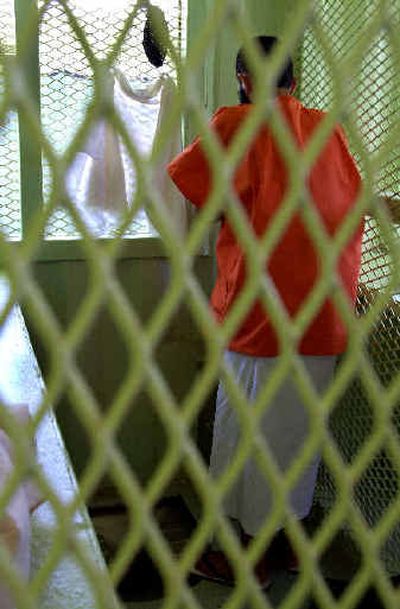Parole hearings could reduce population at Guantanamo

MIAMI – The Pentagon this week held its first formal parole hearing for a captive at Camp Delta, inaugurating a system that could let the military thin its prison population at Guantanamo Bay, Cuba.
On Tuesday, a lone detainee went before the base’s three-officer Administrative Review Board, which will decide whether the captive would not be too dangerous to set free.
No details were available on the captive’s case, and no decision was made, Navy Capt. Beci Brenton said Wednesday.
“We as a government don’t want to hold anyone longer than we need to,” she said. “At the same time we don’t want to be releasing someone who could be a threat. We want to strike that balance.”
The panels will decide, on a case-by-case basis, whether to hold a prisoner for additional interrogation, whether he might face possible trial, and whether he is likely to hurt the United States or Americans if he is freed.
Each prisoner gets an interpreter and a chance to argue his case, and can provide character testimony.
The board is the latest in a series of review processes the Pentagon set up to both reduce prison population and fend off federal courts’ review of the detention center, which the Bush administration created soon after the Sept. 11, 2001, attacks.
Today about 550 men from 42 nations are being held there, ranging from suspected members of Osama bin Laden’s inner circle to foot soldiers from al Qaeda and the U.S.-toppled Afghan Taliban movement. Only four have been charged with crimes.
But paroling prisoners who are not suitable for trial is also risky – because the men may have become radicalized after being held for up to three years at Camp X-Ray and Camp Delta, said former U.S. Navy Judge Advocate General John Hutson, who retired as a rear admiral in 2000.
“A prisoner may have been an 18-year-old goat herder who got caught up in the dragnet and now a few years later he is a terrorist,” said Hutson, dean of the Franklin Pierce Law Center in Concord, N.H. “It is a problem down there. We’re surely not rehabilitating people in Guantanamo. No one is down there learning a trade, making license plates and mattresses. They are being warehoused and interrogated.”
In nearly three years of interrogating prisoners, the Pentagon has released about 156 – many to extended captivity in ally nations. A few have been set free in Afghanistan and reportedly rejoined anti-U.S. forces.
Hutson described the parole board as an improvisation to let the Pentagon free captured combatants even as the so-called war on terror continues. Traditionally, an army holds a prisoner of war until the conflict ends.
In this case, President Bush has refused POW status for Guantanamo detainees and said the war on terrorism will continue for a long time.
“Nobody’s going to sign a surrender on the deck of the USS Missouri in this war,” Hutson said. “Now that the courts have required that you have a competent tribunal, this might serve as a way to thin the herd, so to speak, and release people who have had nothing to do with terrorism for three, four, five, 10 years.”